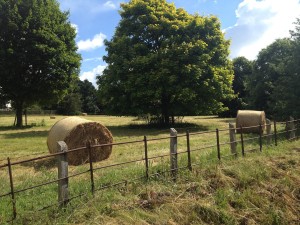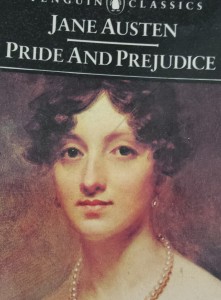More than one reader has remarked on what they describe as the ‘quintessential Englishness’ of ‘The Village’. This is, in part, because of the descriptions of the seasons and the countryside, which are clearly the English seasons and the English countryside; but it’s also because of the  archetypes employed – the village fete, the harvest festival, the pub, the social hierarchy – which are instantly recognisable as part of English life and other English stories.
archetypes employed – the village fete, the harvest festival, the pub, the social hierarchy – which are instantly recognisable as part of English life and other English stories.
And ‘The Village’ is shot-through with other English stories, less readily apparent perhaps, but equally important cultural markers within the Tales. Their literary antecedents and references are, mostly, to English classics, though a Welshman, an Australian, an Irishman and a couple of Americans feature. The last two are hugely influential on me as a writer and, therefore, on these stories. Stories begat stories and books begat books, so, my thinking runs, the least one can do is acknowledge one’s cultural heritage.
There was quite a lot of discussion, on Thursday evening at Clapham Books, of this element, mainly because the story I chose to read was ‘Not Even Waving’ (April). The title of this tale is a reference to Stevie Smith’s famous poem, ‘Not Waving But Drowning’, in which a dead man, drawn from the water after drowning, speaks, saying, ‘I was much too far out all my life, And not waving but drowning.’ Eloquently suggestive of solitariness, loneliness and emotional sterility, these are character traits often associated with a type of Englishness. But in this instance it relates to Diane, narrator of the story, a woman who doesn’t realise that she is unhappy, but is about to find out. She is ‘drowning’ but, all unknowing, she isn’t even waving.
As I said during the discussion, other tales reference other authors. One Tale includes an homage to Jane Austen in a story about reputation and snobbery and within which a character quotes Mr Bennett’s famous line from ‘Pride & Prejudice’, ‘For what do we live, but to make sport for our neighbours….’. In another ‘foul whisperings are abroad’ to reference the English playwright ( but from a play of his not usually called English ) and the first line of another famous poem features in a Tale inspired by, arguably, the greatest English nature poet of them all. And ‘What has fairness to do with the law?’ asks Tanya Towers in The Fourth Estate, to mimic another well-loved English writer’s Arch-Deacon, in a passing nod of gratitude to his chronicles.
 There are lighter references – Gray’s Elegy is quoted by a character when standing in the churchyard, by the ‘ivy-mantled tower’ of St Agnes. In a story which includes a time-slip to an era which, in part, defined the modern idea of Englishness, there is a reference to a poem by an Irishman about a different war. There is, of course, the first line of the whole book, not dissimilar to another famous first line, by another Celt.
There are lighter references – Gray’s Elegy is quoted by a character when standing in the churchyard, by the ‘ivy-mantled tower’ of St Agnes. In a story which includes a time-slip to an era which, in part, defined the modern idea of Englishness, there is a reference to a poem by an Irishman about a different war. There is, of course, the first line of the whole book, not dissimilar to another famous first line, by another Celt.
My two US genii ( ‘though one became totally anglicised ) feature through-out, the first by way of the constellations which appear, sometimes in dubious form, in each Tale ( ‘The life of a village in the life of the stars’ ) the second in the return to the beginning, via a rose garden. Now there’s a good clue…..
I will publish a list of all the literary quotes and references to be found in ‘The Village; A Year in Twelve Tales’ in a couple of months or so. In the meanwhile, please feel free to identify them and let The Story Bazaar and other readers know, via the comment boxes. The title is, of course, from Robert Browning’s ‘Home Thoughts from Abroad’.
If you enjoyed reading this blog piece try How does a book sound? or The Making of an Audio-book


 RSS – Posts
RSS – Posts